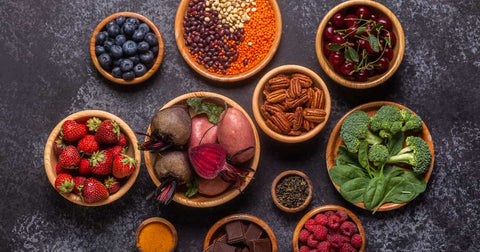Nitric oxide (nitric oxide) is a powerful little molecule critical for blood vessel health, improved circulation, and overall well-being. While your body makes its own, boosting your levels naturally through diet has numerous benefits. Let's uncover the best nitric oxide foods and how they support your health.

Understanding Nitric Oxide
- The Vasodilator: Nitric oxide helps relax and widen blood vessels, promoting healthy blood flow.
- Health Perks: Improved blood flow supports heart health, lowers blood pressure, enhances athletic performance, and may even boost brain function.
- Dietary Boost: Certain foods encourage your body to produce more nitric oxide.
7 High Nitric Oxide Powerhouses to Include
1. Beets: The nitric oxide Superstars:

Beets are packed with nitrates, which your body converts to nitric oxide. Beet juice and whole beets are both beneficial.
2. Leafy Greens: Nitrate All-Stars:

Arugula, spinach, kale… load up! These are among the richest dietary sources of nitrates.
3. Garlic: Flavorful Circulation Booster:

Research suggests garlic helps with both producing nitric oxide and relaxing blood vessels.
4. Citrus Fruits: Vitamin C and Nitric Oxide Power:

Oranges, lemons, grapefruits – their vitamin C aids nitric oxide production and protects blood vessels.
5. Dark Chocolate: Sweet Treat with Benefits:

Choose high-quality dark chocolate (>70% cacao) for its flavonoids, stimulating nitric oxide release. Moderation is key!
6. Nuts & Seeds: Healthy Fat and nitric oxide Fuel:

Rich in arginine (an aminitric oxide acid the body uses to make nitric oxide), walnuts, almonds, pumpkin seeds are great options.
7. Watermelon: The Hydrating nitric oxide Booster:

A tasty source of citrulline, which converts to arginine and then into nitric oxide in your body.
What Foods Have Nitric Oxide? It's More Than Just What You Eat
- Cooking Matters: Some cooking methods can reduce nitrate content – try steaming or roasting veggies instead of prolonged boiling.
- Portions Count: Include nitric oxide-boosting foods regularly for sustained benefits.
- Gut Health is Key: A healthy digestive system is needed to properly absorb and utilize the nutrients that fuel nitric oxide production.
Could a Food Intolerance be Sabotaging Your Nitric Oxide Levels?
Absolutely! Here's why:
- Inflammation Barrier: Food intolerances cause systemic inflammation, which can hinder nitric oxide production and healthy blood vessel function.
- Nutrient Gaps: Intolerances can prevent proper nutrient absorption, including those crucial for nitric oxide production.
- Detective Work: A food intolerance test kit empowers you to discover potential triggers and remove them, supporting overall health and nitric oxide levels.
Nitric Oxide Supplement: Worth It?

- Talk to Your Doctor: Especially if you have existing health conditions.
- Diet First Approach: Prioritize whole-food sources of nitrates and arginine when possible.
- Supplement Support: L-arginine and L-citrulline supplements may be beneficial and are considered safe for most people in the short term.
Focusing on a diet rich in nitric oxide-boosting foods is a delicious way to support overall well-being. Consider a food intolerance test kit to uncover any food triggers that might interfere with optimal health. Remember, your body is amazing, and giving it the right fuel empowers it to thrive!
Disclaimer: This information is for educational purposes and doesn't substitute for personalized medical advice. Always consult a healthcare professional before making significant dietary changes or starting supplements.
Frequently Asked Questions:
1. I'm already eating some of these nitric oxide foods, but not seeing results. Why?
Several factors could be at play: portion sizes (are you getting enough nitrates?), cooking methods (some may destroy nutrients), or an underlying food intolerance undermining your efforts. It's also worth ensuring you give dietary changes enough time to show benefits.
2. I hate beets! Are there other good sources of nitrates for nitric oxide?
Absolutely! Leafy greens like spinach, arugula, and kale are packed with nitrates. Garlic, citrus fruits, and nuts are also great sources of nutrients that support nitric oxide production.
3. Do I need a nitric oxide supplement if I eat these foods regularly?
Most people can get sufficient support from a balanced diet rich in nitric oxide-boosting foods. However, talk to your doctor if you have concerns about your levels or existing health conditions. Short-term L-arginine or L-citrulline supplements might be beneficial for some.
4. How long does it take for food to affect nitric oxide levels? You might feel some benefits quickly (like the warmth from beet juice), but consistent improvement comes with regular inclusion of these foods. Think of it like strengthening a muscle – dietary changes build up their effects over time.
5. Can food intolerances really lower nitric oxide?
Yes! The inflammation caused by food intolerances can disrupt healthy blood vessel function and hinder nitric oxide production. An at-home food intolerance test kit can help identify any potential triggers hindering your health.


.png?v=1737390083)
.png?v=1737187409)


